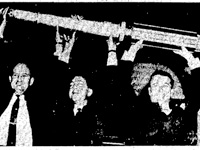Spaces of Calculation: Street Addressing and the Making of a Geo-coded World
According to the Library of Congress website, "Street addressing is one of the most basic strategies employed by governmental authorities to tax, police, manage, and monitor the spatial whereabouts of individuals within a population. Despite the central importance of the street address as a "political technology," few scholars have examined the historical and contemporary practice of street addressing with respect to its broader social, political, and ontological implications. When, where, and why did the technique of house numbering historically emerge as a mechanism of spatial ordering? How did it come to be so taken for granted as part of everyday life in post-industrial societies?
In this presentation, Kluge Fellow Reuben Rose-Redwood explores the cultural and political history of street addressing in the United States, from the late 18th century to the present, including the recent shift from rural route and box numbering systems to 911 addresses."
